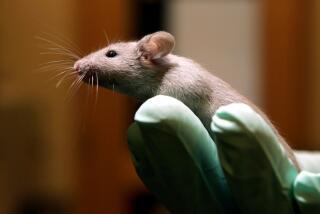1,000 Human Genes Inserted in Mice
Japanese geneticists have for the first time transferred huge quantities of human DNA into mice, a feat that could eventually lead to new ways for producing human proteins effective against a broad variety of diseases.
Although researchers have previously been able to introduce human DNA containing a few genes into mice, the Japanese team reports today in the journal Nature Genetics that it was able to insert a whole human chromosome containing more than 1,000 genes. The inserted genes, furthermore, were able to carry out their normal human functions in the mice and, in some cases, were transmitted intact to the animals’ offspring.
“The sheer impact of transferring a piece of DNA that big is amazing,” immunologist Howard Petrie of the Memorial Sloan-Kettering Cancer Center in New York told the Washington Post. “It opens up a whole array of things that can be done.”
In addition to producing human proteins, researchers hope to use the new technique to study how human genes are turned on and off. They might even be able to develop new animal models of human diseases, such as Down syndrome.
Geneticist Kazuma Tomizuka and his colleagues at the research laboratories of Kirin Brewery Co. in Yokohama fused human skin cells with cells from mouse embryos. Some of the fused cells contained a full set of 40 mouse chromosomes along with one or two human chromosomes.
These hybrid cells were then joined to an early mouse embryo and implanted in females, where they grew into intact animals. Many of the cells in these mice contained the human chromosomes. Most of the mice looked normal, but some of the males had small testicles and were sterile, suggesting that the transferred DNA somehow interfered with their normal development.
Tomizuka was particularly interested in human chromosomes 14 and 22, which carry the genes necessary for manufacturing antibodies. When they inserted foreign substances into mice carrying these chromosomes, the mice produced human antibodies against the substances. In the future, researchers might inject antigens from the surface of cancer cells or portions of a virus.
Mouse antibodies produced in this fashion are frequently used to fight diseases such as cancer, but they have limited effectiveness. Human bodies recognize the mouse antibodies as foreign and quickly mount an attack against them, so the antibodies can only be used once. The Kirin team hopes that human antibodies produced in mice will not be rejected so rapidly and thus will be more effective against the diseases.
Researchers also hope the new technique can be used to study the control of genes. Often, when researchers insert just a few genes into mice, they are unable to make them function because the regulatory genes are not present. Inserting the entire chromosome circumvents that problem.
Finally, researchers hope to be able to create animal models of certain human diseases. Down syndrome, for example, is produced by the presence of an extra copy of chromosome 21. Geneticists hope that inserted that chromosome into mouse cells will give the mice a similar disorder, enabling researchers to study how it develops and to test new treatments.






